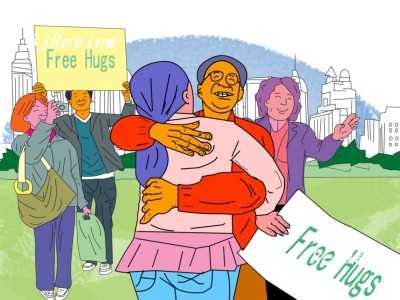
For most Westerners, hugging is a perfectly acceptable way of greeting people, making contact and showing affection, but traditionally in China it goes against the cultural grain. It was therefore surprising to see a campaign sweeping several Chinese cities late last year, promoting "free hugs" on the streets by groups of young people whose sole mission was to cheer people up.
Waving placards bearing slogans like "Care From Strangers" and "No to Apathy," the huggers approached pedestrians, arms wide open offering an embrace. The hugging began in Changsha and spread to Beijing, Nanjing, Guangzhou, Tianjin, after organizers had become inspired by Jason Hunter, an American who launched free-hugs.com back in 2001 to promote "happiness and our sense of belonging."
In Beijing police detained huggers for questioning, but they were later released after explaining what they were doing and warned that they needed warrants to give street huggings. "We are enriching the meaning of 'free hugs'-the hugging is just a message. The whole concept of warm hugs is to bond people and melt their coldness," the Beijing campaign organizer known as Mars told Xinhua, adding that they will continue to give free hugs on the streets.
Members of the campaign connect with each other through the Internet, in the hope that through embracing others online it will help them to interact with strangers in real life situations.
The hugging campaign set the cat among the pigeons. Supporters believe that apart from improving interpersonal relations, free hugs will also contribute to social harmony, while opponents argue that free hugs are contrary to the way Chinese are used to expressing their feelings and will therefore not become popular in Chinese society. Some are even afraid that this campaign will be used to somehow create social problems. They believe hugs are acceptable only when a close relationship exists between people or at least people know each other. Sudden hugs on the streets are surprising and such strange and unexpected behavior will make people feel embarrassed and not respected. It's better to show more care and kindness to people who live and work with you, than hug strangers, they say.
Members of the campaign, however, say that people will feel moved by warm hugs. Understanding that Chinese are not used to free hugs, campaign members never try to hug strangers without permission, but are quick to hug if there is a positive response.
While there is ample proof that the campaign is arousing people's sense of caring for each other, most people believe that to be kind to people around you is more meaningful than giving free hugs.
| 